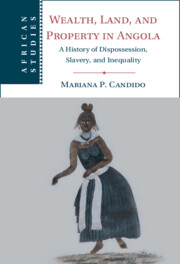Book contents
- Wealth, Land, and Property in Angola
- African Studies Series
- Wealth, Land, and Property in Angola
- Copyright page
- Contents
- Maps and Plans
- Illustrations
- Tables and Graphs
- Acknowledgments
- A Note on Currency and Price-Level Adjustments
- Introduction
- 1 Who Owned What?
- 2 Property Rights in the Nineteenth Century
- 3 Written Records and Gendered Strategies to Secure Property
- 4 Commodification of Human Beings
- 5 Branded in Freedom
- 6 The Erasure of Communal Rights
- 7 Global Consumers: West Central Africans and the Accumulation of Things
- Conclusion
- Bibliography
- Index
- African Studies Series
3 - Written Records and Gendered Strategies to Secure Property
Published online by Cambridge University Press: 22 September 2022
- Wealth, Land, and Property in Angola
- African Studies Series
- Wealth, Land, and Property in Angola
- Copyright page
- Contents
- Maps and Plans
- Illustrations
- Tables and Graphs
- Acknowledgments
- A Note on Currency and Price-Level Adjustments
- Introduction
- 1 Who Owned What?
- 2 Property Rights in the Nineteenth Century
- 3 Written Records and Gendered Strategies to Secure Property
- 4 Commodification of Human Beings
- 5 Branded in Freedom
- 6 The Erasure of Communal Rights
- 7 Global Consumers: West Central Africans and the Accumulation of Things
- Conclusion
- Bibliography
- Index
- African Studies Series
Summary
Chapter 3 focuses on the strengthening of the bureaucracy and written culture that, by the early nineteenth century, created an ersatz historical proof and solidified territorial and political claims. After two centuries of conquest, by the turn of the nineteenth century, new forms of official records, such as land registries, deeds, and inventories, and the expansion of surveys and reports led to an association between individual ownership, written registration, and property recognition. As in other colonial experiences, paper records represented authenticity and legitimation in the eyes of colonizers and also brought changes in the perceptions of governance. Ndombe, Kilengues, Kakondas, and Bienos embraced written evidence and paper power as providing proof of ownership. The existence of the paper created a new reality, that is, the idea that occupation and possession could be proven, that an individual was a landowner, a farmer, and a respectable resident of the colonial town. The establishment of written records and venues for petition such as courts allowed colonial subjects to make use of the colonial law and bureaucracy to strategically survive the new legal order and claim rights.
- Type
- Chapter
- Information
- Wealth, Land, and Property in AngolaA History of Dispossession, Slavery, and Inequality, pp. 97 - 137Publisher: Cambridge University PressPrint publication year: 2022



